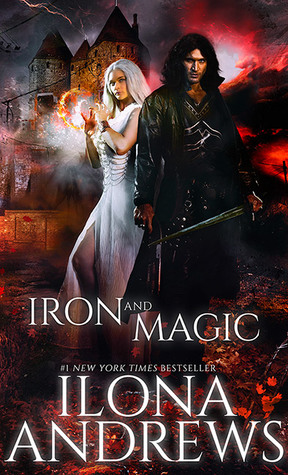Review: Ilona Andrews’s “Iron and Magic”
by Miles Raymer
After falling in love with the Kate Daniels series back in 2016, I was excited to learn that Ilona Andrews had released the first installment of a spin-off trilogy set in the same world. And while Iron and Magic is a fun visit to one of my favorite fantasy destinations, it doesn’t pack the same punch as the Kate Daniels books.
Iron and Magic is the story of what happens to Hugh d’Ambray, Roland’s cocky warlord, after he is banished from Roland’s army for failing to deliver Kate Daniels into his master’s creepy paternal clutches. As the final conflict between Kate and Roland picks up steam in the background, we find Hugh getting wasted in taverns to cope with the loss of his magical connection with Roland, which has been his wind and sail since childhood. Playing with tropes of addiction, Andrews depicts Hugh’s severance from Roland’s power––the “void”––as a debilitating form of withdrawal:
The void had finally caught him. Hugh stood at the window while it pierced him with needle teeth and shredded him, skinning one thin layer at a time. He’d known pain before. He’d been shot, cut, burned, broken, tortured, but this was different. This was the same pain he felt when Roland had sent him into exile. (loc. 946)
This theme is a suitable addition to the long list of ways Andrews has found to cleverly “magicalize” normal human problems––perhaps the strongest aspect of the wife-husband duo’s considerable (if decidedly non-literary) talent. Encouraged by his loyal troop of hand-picked fighters, the Iron Dogs, Hugh manages to get himself away from the bottle long enough to manufacture a tenuous alliance with a nearby community of mysterious magic users. This group is led by Elara, a white-haired witch who reluctantly agrees to marry Hugh in order to solidify the partnership. Hugh needs a sanctuary from Roland’s forces, and Elara needs protection for her people. The marriage is hilariously awful at first, complete with the quippy banter and tension-infused moments for which Andrews is well known. As the story unfolds, the highly predictable but still fun to watch relationship transitions from grim animosity to cautious affection to full-blown passion.
Hugh and Elara are both interesting and fully-realized protagonists (at least insofar as one expects from genre fiction), but unfortunately they’re the only characters in this book with much character at all. This is the biggest disparity between this book and those in the Kate Daniels series, which is flush with quirky and memorable ancillary characters enacting lively interpersonal subplots. Andrews still has two more books to build out a similar dynamic in the Iron Covenant trilogy, but prospects are not favorable given the blandness of this first effort.
Iron and Magic also suffers from a problem that enfeebles a few of the Kate Daniels books, which is the lack of a compelling antagonist. Roland’s henchman who eventually comes after Hugh is a real jerk, but nothing special, and the weird scale-armored goons they spend most of the book fighting are even less interesting.
If it weren’t for the energetic and sexy edginess between Hugh and Elara, this book would be dead in the water. Fortunately, the story stays focused on the two main characters, allowing enough meaningful development for the reader to genuinely care about them both. This will prove an especially satisfying process for those already familiar with the Kate Daniels narrative, where Hugh is a decidedly obnoxious douchebag. I truly enjoyed seeing Hugh morph into a halfway decent dude and watching him learn to assert his independence as a moral agent:
He had lost the soothing clarity of Roland’s connection, but he’d traded it for a grim clarity. He had done what was necessary. It was bloody and it tore him up, but he had done it, not because Roland deemed it right, but because Hugh himself decided it was right. (loc. 4561)
Iron and Magic has a fitting and raucous climax that is much better than anything that comes earlier in the novel. There’s a classic Andrews-style battle that doesn’t disappoint, including some promising tie-in potential for the forthcoming Magic Triumphs. Whether Hugh and Elara’s tale can become something worthy in its own right remains to be seen, but I’m optimistic given the genuinely difficult and intriguing predicament outlined in the book’s closing chapter. I’ll likely get in line to read the next one, if for no other reason than to fill the void in my own life that the conclusion of the Kate Daniels series is about to create.
Rating: 6/10
